30 years of hope: my life as an ardent Liverpool fan | Football
I am three years old in the photograph, hugging a plastic, flyaway football. I am seven, arriving tentatively for my first training session at a local girls’ club. I am bounding back to my mother’s car, blowing hot breath on cold hands, beaming, the salt from the artificial turf embedded in the soles of my trainers.
I am eight and glued to the television, watching teen wunderkind and my Liverpool hero, Michael Owen, score the perfect goal against Argentina in World Cup 98.
I am nine. I give up one of the few days I have to visit my father to attend my first ever match at Anfield, Liverpool FC’s famous stadium. A week later, my father dies. These two events are inextricably linked in my mind, and the guilt continues to whichever day you are reading this.
I am 10 and make my first appearance in print in a feature for the local paper, the Liverpool Echo, about girls getting into football. I am quoted as saying that all my sister cares about is boys and fashion.
Twelve years old and the fuzzy letters of “Parkinson” on the back of my shirt arch down my shoulder blades.
I am 13. Our team, known as Liverpool Feds, are approached by Liverpool FC to become their official girls’ outfit. We visit Melwood, the first team’s training ground. The full-size goals loom like scaffolding.
I am 14. My hero, Owen, makes the same move to Real Madrid that Steve McManaman made five years before him. This breaks my heart. Suddenly, all I care about is boys and fashion. Without really making a decision, I give up football. Cold winter nights are spent inside on the sofa watching Sex and the City. I discover live music and MySpace.
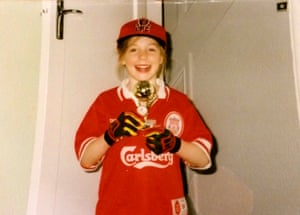
I am 15. I own the entire range of Clearasil products. A group of my schoolfriends and I take a night off GCSE revision to watch the 2005 European Champions League final in Istanbul; the first the club has reached since the mid-80s, and so it is forbidden not to watch. Liverpool are losing by three goals at half time. A lost cause. Minds wander to the second biology paper… But wait. Liverpool pull back to 3-3. And win on penalties. Pandemonium. We join the throng in the streets; the blaring car horns; the beer jumping, like salmon, from pint glasses; the embrace of strangers; the straining vocal cords.
I am 18 and living in Russia, watching games on my first-generation smartphone via a 2G internet connection. Each time a player goes through on goal the signal drops to endless buffering. Liverpool finish second in the league, four points behind bitter rivals Manchester United.
I am 26, we are bearing down on the title. Steven Gerrard in an impromptu on-pitch team talk, after a crucial win against the newly flush Manchester City, shouts hoarsely at his players: “This does not fucking slip now!” The next home game, Gerrard – one of the best players the club has ever seen, captain, scouser, Liverpool FC lifer – literally slips on the turf against Chelsea to concede a goal. We lose. Manchester City finish top of the league by two points.
I am 29. I am in Cuba, where the internet is heavily censored. But I manage to watch the last game of the season, which will be decisive. Liverpool finish the league with 97 points; the highest points tally ever for a team that doesn’t win the title. City win again. With 98 points. Liverpool do, however, win the Champions League – for the sixth time – after scoring four goals in a sublime semi-final comeback against Barcelona. The injured Mohamed Salah, watching on the bench, wears a T-shirt bearing the slogan “Never Give Up”. The T-shirt sells out.
I am 30. I have never witnessed my beloved Liverpool FC lift the title. Two months from now, this is going to change. As I write Liverpool have a 22-point lead at the top of the table. Of 84 points available this season, they have taken 79. Next Monday is the derby against Everton.
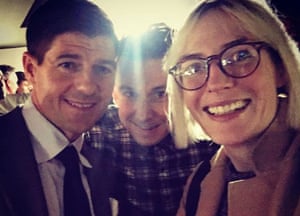
I want to untangle what this will mean to me – the fan who met Steven Gerrard a couple of years ago, grinning like a child; the fan who, two weeks ago, was unbelievably touched when current star Trent Alexander-Arnold recorded a video message to cheer her up during a bad time. What it means to other fans: those who witnessed the dominance of the 1980s, and the younger ones who have known only disappointment. And what it means, too, for the future of the area of Anfield itself.
It’s late February in the Flat Iron pub, one of the many dotted around Anfield. Steve Dodd, who is 49, is with his friends Dan Wynn, 26, and Gerrard Noble, 47. All from Somerset, they are having a pre-match drink before the home game against West Ham. Steve talks of the current Jürgen Klopp-assembled side as the best Liverpool side he thinks he’s ever seen.
The friends have been scouring the internet for places to stay in the city for the last home fixture of the season, but to no avail. “Rooms are going for £400 a night,” Gerrard says, his eyes widening. He and Steve are allowing themselves to get excited, but Dan, who like me has yet to experience a league title win, looks anxious and rubs his thighs. “No,” he says, “I don’t want to jinx it. Though I’ve been kicked out of various WhatsApp groups for being smug about all the results.” Steve tells me they weren’t prepared for it, this three-decade-long wait: “I just thought we’d go on winning.”
We talk about how important it is that Klopp’s politics match the club: Liverpool is a leftwing city; Liverpool is a leftwing club. At the last election, Labour retained all of its 14 MPs on Merseyside. The city has never forgiven the Tories for former chancellor Geoffrey Howe’s strategy of “managed decline”. Thatcher is a hated figure. But so is Derek Hatton, the former city council deputy leader and member of the Marxist group Militant. Last month, Italy’s rightwing politician Matteo Salvini was forced to deny that he had pulled out of a visit to Liverpool after the metropolitan region’s mayor called him a “fascist”. During several games last year, chants rang out for Jeremy Corbyn. The current prime minister conspicuously avoids visiting. As Gareth Robertson, who is a part of the immensely popular The Anfield Wrap podcast, with more than 200,000 weekly downloads in 200 countries, puts it to me: “Not only do we want a good football coach, we expect almost a political leader, someone who gets us, and our city, its values.” Humorously, there have been petitions for Liverpool to become a self-determined scouse state, and “Scouse not English” is a frequent terrace chant.
The club has a mantra: “This means more.” It pisses off other teams and is, understandably, dismissed as marketing speak. But isn’t it true? Isn’t the 127-year-old club what people think of when anyone, anywhere in the world, mentions “Liverpool”? The famous football team that plays in red – allowing for the Beatles, of course.
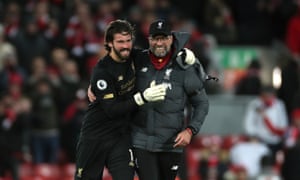
The city has another team, the blue of Everton. I have nothing against Everton. I consider Everton fellow scousers and too little a threat to focus animosity towards. In a way, the clubs are unruly siblings; we love and scrap in equal measure. Totally different personalities, but born of the same streets.
Four years ago, a man named Jürgen Klopp arrived on these streets. Or more accurately, he arrived in the suburb of Formby, renting the house from his managerial predecessor, Brendan Rodgers. Klopp is the football manager that even non-football fans like. He’s Ludovico Einaudi, seducing those previously uninterested in classical music. He is a man of principle; a baseball cap permanently affixed to his head, as though at any point he might be required to step up to the plate on a blindingly sunny day. Perhaps for the Boston Red Sox, owned by Liverpool FC’s American proprietor, John W Henry.
Klopp is erudite. He is proudly anti-Brexit in a city that voted 58% Remain. “For me, Brexit makes no sense at all,” he has said. He is a socialist: “I am on the left … I believe in the welfare state. I’m not privately insured. I would never vote for a party because they promised to lower the top tax rate. If there’s something I will never do in my life it is vote for the right.” He grew up in a humble village in Germany’s Black Forest, and it shows. There’s a saying in the region: “the hair in the soup”. It means focusing on even the tiniest things that can be improved.
He has the good looks of one of my favourite 1960s Russian film stars, Aleksandr Demyanenko. He hugs his players as though they were the loves of his life and he might never see them again. Journalists like him for his press-conference banter as well as his eloquence. He visits children in hospitals. He is funny. When Mario Götze, one of his star players at former club Borussia Dortmund, left for Pep Guardiola’s Bayern Munich, his explanation was: “He’s leaving because he’s Guardiola’s favourite. If it’s anyone’s fault, it’s mine. I can’t make myself shorter and learn Spanish.”
Liverpool have had many famous managers, of course. Bill Shankly (there’s a statue of him outside the ground); Bob Paisley (ditto); Kenny Dalglish. But Klopp is already being talked of as one of the best ever.
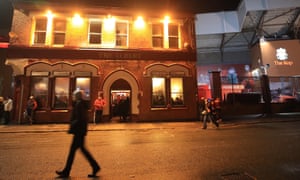
Liverpool the city has evolved from its shamefully prominent role in the slave trade – in common with other major British ports – to a place with a diverse population and a well-won reputation for being friendly and welcoming. But the tragedy and scandal of Hillsborough, in which 96 fans were crushed to death in 1989 at Sheffield Wednesday’s ground, is etched into the nation’s sporting history, and its social justice record. After a 27-year-long battle to clear the names of the Liverpool fans whose reputations were smeared, after inquests that lasted two years – the longest case heard by a jury in British legal history – a verdict of unlawful killing was returned. But, as Margaret Aspinall of the indefatigable Hillsborough Family Support Group pointed out, after David Duckenfield, police commander at the ground, was cleared of manslaughter last year, no one has yet been found accountable for those killings.
The Sun, which categorically did not report “The Truth”, as the infamous headline went, but was found to have published untruths that blamed Liverpool fans for the disaster, is a red-top pariah here. The paper is the bestselling national in print, but shifts a measly 12,000 or so copies on Merseyside. A branch of Sainsbury’s was once found to be selling copies under the counter, as though they were counterfeit cigarettes. It’s a boycott that has lasted longer than many marriages.
The socially progressive values of the club extend to it supporting an end to period poverty – free sanitary products are available in every women’s loo at Anfield. Last month, the Reds Going Green initiative saw the installation of organic machines to break down food waste into water. The club even has its own allotment, which grows food to serve to fans in the main stand. It was the first Premier League club to be officially involved with an LGBT Pride event in 2012, at the invitation of Paul Amann. Amann tells me how he set up the LGBT supporters group, Kop Outs, because: “It’s essential that our voices are heard, our presence is welcomed and respected.” The group works alongside the Spirit of Shankly supporters’ group and the Fans Supporting Foodbanks initiative and has regular meet-ups. These things mean something to me: a football fan as a girl, and now as a woman. A woman who dates other women. A woman who doesn’t want to hear homophobic chants on the terraces. Or, it goes without saying, racist ones. Jamie Carragher, ex-player and pundit, has apologised on behalf of the club for its backing of striker Luis Suárez, who was banned from playing for eight matches in 2011 for making racist comments. “We made a massive mistake,” Carragher said. “What message do you send to the world? Supporting someone being banned because he used some racist words.”
Back on the pitch, some of this season’s performances have been, quite simply, balletic. Others as powerful and muscular as a weightlifting competition. Formations as beautiful as constellations. Forward surges as though our fullbacks were plugged into the mains. Possibly the best fullbacks playing today: 21-year-old local lad Trent Alexander-Arnold (known just as Trent) and the fiery Scot Andy Robertson (Robbo) are spoken about by pundits as innovators. Gary Lineker and I text, rapturously, about the two of them.
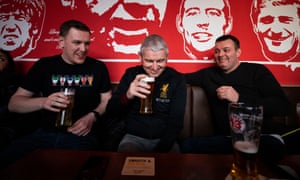
For a football team to be consistent, for a team to win the league, it must be capable of winning in many different ways. The aesthetically pleasing playing out from the back. Lightning counter-attacks. Scraping 1-0 wins in the final minutes (and, particularly at the start of this season, we have done a lot of that. It’s something Manchester United used to do in their 90s pomp, and naturally, I hated them for it). Mindful of the trauma of The Slip, the agreed club line is “one game at a time”, said again and again, as another scouse son, Pete Burns, once sang: “like a record baby, right round, round, round… ” And my God, how many of those we’ve smashed. The current side is the first in England to hold an international treble (the Champions League; Uefa Super Cup; Fifa Club World Cup). We have not lost a home game for almost two calendar years. Shortly, we’ll no doubt break the record for the earliest title win during a season; the most points across Europe’s top five leagues.
It is, even to the neutral, extraordinary stuff. It is, even to the haters, albeit grudgingly, extraordinary stuff. In 2016, one of the greatest stories of modern football was the previously mediocre Leicester City winning a surprise title. Liverpool’s dominance this season surpasses that for drama. It is watching history in the present.
Being at a game at Anfield is like being high while ingesting nothing. The stands seem to have lungs. Though You’ll Never Walk Alone has become supremely emotional, an anthem for strength and perseverance post-Hillsborough (“walk on through the wind / walk on through the rain”) it’s a song originally from the musical Carousel. It was a standout 1963 cover version by Liverpudlian band Gerry and the Pacemakers that kicked off its adoption at Anfield. “It’s got a lot of lovely major-to-minor changes at often unexpected moments that have the effect of emotionally blindsiding you,” music journalist Pete Paphides says (although he’s a United fan, so feel free to discount everything he tells me). “But it’s also obviously very hymnal, with a chorus which invites that religious ambiguity. It was Aretha Franklin’s version that John Peel played after Hillsborough and rendered himself incapable of carrying on by virtue of doing so.”
Anfield has always been something special; players from countless teams often talk of it being the greatest ground they have ever played at. Or the most intimidating. Or the most electric. But of late, there’s an extra buoyancy. The crowd salivates.
Watching the game against West Ham, we take the lead within 10 minutes, but they quickly equalise, before going ahead. We score twice more. It is our 21st consecutive home win, setting a Premier League-era record. At the end of the game, Klopp and his players applaud the Kop end, fans’ eyes glistening with both emotion and wind chill (“walk on, through the wind… ”)
Adjacent to the stadium at the redbrick Albert pub, Clara, Tom, John – all in their 20s, students, and local – and John’s dad, David, who is 53, are cheering the last-ditch win. I repeat what I asked Steve and his friends: just how excited should we all be?
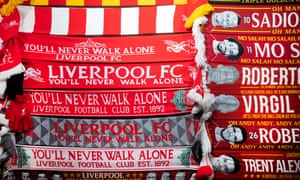
“Very fucking excited,” says John. “Very fucking excited,” Tom concurs. (Scousers use swear words as ellipses. And the speed of Liverpudlian patter matches the rat-a-tat-tat of freestyle rappers.) The Albert is floor-to-ceiling in flags; unassuming from the outside, iconic inside. Across the road at the Park – the “Established 1888” sign above its door – it is Where’s Wally? levels of rammed, entirely usual for a match day. But the mood is as disbelieving as triumphant. It hasn’t happened yet, but it already feels as though people are waiting to be shaken awake from a dream. Around the corner, posters at another fan favourite, the Sandon, advertise a huge end-of-season victory party. I grab a burger at the Kop of the Range, a kebab joint not far from a scarf stall that has seen its business rocket over the past three years.
My Uber driver, Mohamed, 35, moved to the city from Sri Lanka. A massive Salah fan, he tells me his own revenue booms when the club win a game – happier fans means higher fares. “People don’t want to spend money on a loss,” he says. “If we win, the whole mood lifts. You can feel it in the car. Though when you start driving with Uber, they tell you not to mention what football team you support. Because football means a lot to people. There are many feelings involved with football.”
It’s unsurprising to me that even back in Sri Lanka, Mohamed was a fan. Liverpool is a global behemoth. The richest club in the UK outside Manchester.
A £1.7bn valuation; £533m turnover; pre-tax profits of £42m. Matchday ticket revenues increased (thanks to a regenerated £110m main stand). Visiting the club shop, there is LFC-branded gin; babygros; even a Hello Kitty tie-in range. As Richard Haigh at consultants Brand Finance tells me, next season’s kit deal with Nike is “expected to represent the largest in history. Brands will be willing to pay to have some magic dust of LFC.” There are official stores as far afield as Dubai and Bangkok.
John W Henry has won the support of the fans for his positive handling of the club. And yet, despite this huge wealth, Anfield is the 10th most deprived neighbourhood in the country. Boarded-up houses surround the stadium. The club has not covered itself in glory in the past, accused of buying up properties in unscrupulous ways. But it is hoped that local enterprises, such as the community-run Homebaked cake shop and new housing association properties, will make the neighbourhood better.
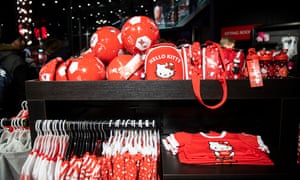
Last week, we were knocked out of the FA Cup in a match against Chelsea. Or, as I call that fixture, Kensington versus Kensington. (In Liverpool’s “Kenny”, 98% of residents are among the most deprived 5% nationally. In London’s, residents earn three times the national average.)
In the league, there has been a blip. Last weekend we finally lost. And we lost 3-0 to, with the greatest respect, Watford; not a bad side, but a side ensconced in a relegation battle. Arsenal, who once went a whole season unbeaten (“the Invincibles”), and are keen to keep that record, tweeted from the official club account: “Phew!”
But I am not panicking. It’s possible Dan from the Flat Iron is panicking. But Klopp isn’t panicking. In typical fashion, he said the fact we played an absolutely awful game of football was “rather positive… ”
“A couple of years ago,” our hero reminds us, “I said we wanted to write our own stories and create our own history, and obviously the boys took what I said really seriously. It is so special. The numbers are incredible.” In a nod to Sir Alex Ferguson’s famous line that his greatest challenge was “knocking Liverpool right off their fucking perch”, Liverpool chief executive Peter Moore says now: “We are back on our perch.” As The Anfield Wrap’s Gareth says: “In a dream scenario, a period of dominance follows. Not so long ago that dream was just that. Now, it’s a reality that is much easier to imagine.”
Four more games. Eyes on the prize. For me, at last, 30 years in the making, eyes on the prize.



